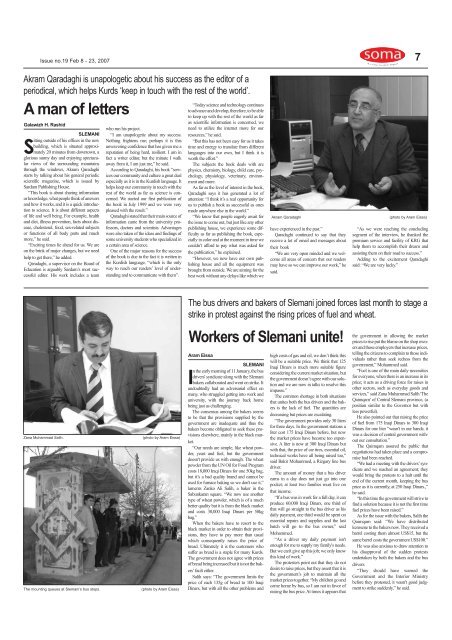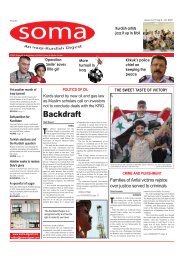Turkish interference A peaceful Ashura - Soma Digest
Turkish interference A peaceful Ashura - Soma Digest
Turkish interference A peaceful Ashura - Soma Digest
Create successful ePaper yourself
Turn your PDF publications into a flip-book with our unique Google optimized e-Paper software.
Issue no.19 Feb 8 - 23, 2007<br />
Akram Qaradaghi is unapologetic about his success as the editor of a<br />
periodical, which helps Kurds ‘keep in touch with the rest of the world’.<br />
A man of letters<br />
Galawizh H. Rashid<br />
SLEMANI<br />
Sitting outside of his offices in the new<br />
building, which is situated approximately<br />
20 minutes from downtown, a<br />
glorious sunny day and enjoying spectacular<br />
views of the surrounding mountains<br />
through the windows, Akram Qaradaghi<br />
starts by talking about his general periodic<br />
scientific magazine, which is issued by<br />
Sardam Publishing House.<br />
“This book is about sharing information<br />
or knowledge, what people think of answers<br />
and how it works, and it is a quick introduction<br />
to science. It is about different aspects<br />
of life and well being. For example, health<br />
and diet, illness prevention, facts about disease,<br />
cholesterol, food, sex-related subjects<br />
or functions of all body parts and much<br />
more,” he said.<br />
“Exciting times lie ahead for us. We are<br />
on the brink of major changes, but we need<br />
help to get there,” he added.<br />
Qaradaghi, a supervisor on the Board of<br />
Education is arguably Sardam’s most successful<br />
editor. His work includes a team<br />
who run his project.<br />
“I am unapologetic about my success.<br />
Nothing frightens me; perhaps it is this<br />
unwavering confidence that has given me a<br />
reputation of being hard, resilient. I am in<br />
fact a writer editor, but the minute I walk<br />
away from it, I am just me,” he said.<br />
According to Qaradaghi, his book “services<br />
our community and culture a great deal<br />
especially as it is in the Kurdish language. It<br />
helps keep our community in touch with the<br />
rest of the world as far as science is concerned.<br />
We started our first publication of<br />
the book in July 1999 and we were very<br />
pleased with the result.”<br />
Qaradaghi stated that their main source of<br />
information came from the university professors,<br />
doctors and scientists. Advantages<br />
were also taken of the ideas and findings of<br />
some university students who specialized in<br />
a certain area of science.<br />
One of the major reasons for the success<br />
of the book is due to the fact it is written in<br />
the Kurdish language, “which is the only<br />
way to reach our readers’ level of understanding<br />
and to communicate with them”.<br />
Zana Muhammad Salih. (photo by Aram Eissa)<br />
The mounting queues at Slemani’s bus stops. (photo by Aram Eissa)<br />
“Today science and technology continues<br />
to advance and develop, therefore, to be able<br />
to keep up with the rest of the world as far<br />
as scientific information is concerned, we<br />
need to utilize the internet more for our<br />
resources,” he said.<br />
“But this has not been easy for us it takes<br />
time and energy to translate from different<br />
languages into our own, but I think it is<br />
worth the effort.”<br />
The subjects the book deals with are<br />
physics, chemistry, biology, child care, psychology,<br />
physiology, veterinary, environment<br />
and more.<br />
As far as the level of interest in the book,<br />
Qaradaghi says it has generated a lot of<br />
attention: “I think it’s a real opportunity for<br />
us to publish a book as successful as ones<br />
made anywhere else in the world.”<br />
“We know that people eagerly await for<br />
the issue to come out, but just like any other<br />
publishing house, we experience some difficulty<br />
as far as publishing the book, especially<br />
in color and at the moment in time we<br />
couldn’t afford to pay what was asked for<br />
the publication,” he explained.<br />
“However, we now have our own publishing<br />
house and all the equipment was<br />
brought from outside. We are aiming for the<br />
best work without any delays like which we<br />
SLEMANI<br />
In the early morning of 11 January, the bus<br />
drivers' syndicate along with the Slemani<br />
bakers collaborated and went on strike. It<br />
undoubtedly had an adversarial effect on<br />
many, who struggled getting into work and<br />
university, with the journey back home<br />
being just as challenging.<br />
The consensus among the bakers seems<br />
to be that the provisions supplied by the<br />
government are inadequate and thus the<br />
bakers become obligated to seek these provisions<br />
elsewhere, mainly in the black market.<br />
“Our needs are simple, like wheat powder,<br />
yeast and fuel, but the government<br />
doesn't provide us with enough. The wheat<br />
powder from the UN Oil for Food Program<br />
costs 18,000 Iraqi Dinars for one 50kg bag,<br />
but it’s a bad quality brand and cannot be<br />
used for furnace baking so we don't use it,”<br />
laments Zanko Ali Salih, a baker in the<br />
Sabunkaran square. “We now use another<br />
type of wheat powder, which is of a much<br />
better quality but it is from the black market<br />
and costs 30,000 Iraqi Dinars per 50kg<br />
bag.”<br />
When the bakers have to resort to the<br />
black market in order to obtain their provisions,<br />
they have to pay more than usual<br />
which consequently raises the price of<br />
bread. Ultimately it is the customers who<br />
suffer as bread is a staple for many Kurds.<br />
The government does not agree with prices<br />
of bread being increased but it is not the bakers’<br />
fault either.<br />
Salih says: “The government limits the<br />
price of each 135g of bread to 100 Iraqi<br />
Dinars, but with all the other problems and<br />
Akram Qaradaghi (photo by Aram Eissa)<br />
have experienced in the past.”<br />
Qaradaghi continued to say that they<br />
receive a lot of email and messages about<br />
their book<br />
“We are very open minded and we welcome<br />
all areas of concern that our readers<br />
may have so we can improve our work,” he<br />
said.<br />
Workers of Slemani unite!<br />
high costs of gas and oil, we don’t think this<br />
will be a suitable price. We think that 125<br />
Iraqi Dinars is much more suitable figure<br />
considering the current market situation, but<br />
the government doesn’t agree with our solution<br />
and we are now in talks to resolve this<br />
impasse.”<br />
The common shortage in both situations<br />
that unites both the bus drivers and the bakers<br />
is the lack of fuel. The quantities are<br />
decreasing but prices are escalating.<br />
“The government provides only 30 liters<br />
for three days. In the government stations a<br />
liter cost 175 Iraqi Dinars before, but now<br />
the market prices have become too expensive.<br />
A liter is now at 300 Iraqi Dinars but<br />
with that, the price of car tires, essential oil,<br />
technical works have all being raised too,"<br />
said Bakir Mohammed, a Rizgary line bus<br />
driver.<br />
The amount of money that a bus driver<br />
earns in a day does not just go into one<br />
pocket; at least two families must live on<br />
that income.<br />
“If a bus was in work for a full day, it can<br />
produce 60,000 Iraqi Dinars, one third of<br />
that will go straight to the bus driver as his<br />
daily payment, one third would be spent on<br />
essential repairs and supplies and the last<br />
batch will go to the bus owner,” said<br />
Mohammed.<br />
“As a driver my daily payment isn't<br />
enough for me to supply my family's needs.<br />
But we can't give up this job; we only know<br />
this kind of work.”<br />
The protesters point out that they do not<br />
desire to raise prices, but they assert that it is<br />
the government’s job to maintain all the<br />
market prices together. “My children go and<br />
come home by bus, so I am not in favor of<br />
raising the bus price. At times it appears that<br />
7<br />
“As we were reaching the concluding<br />
segment of the interview, he thanked the<br />
premium service and facility of KRG that<br />
help them to accomplish their dream and<br />
assisting them on their road to success.”<br />
Adding to the excitement Qaradaghi<br />
said: “We are very lucky.”<br />
The bus drivers and bakers of Slemani joined forces last month to stage a<br />
strike in protest against the rising prices of fuel and wheat.<br />
Aram Eissa<br />
the government in allowing the market<br />
prices to rise put the blame on the shop owners<br />
and those employers that increase prices,<br />
telling the citizens to complain to those individuals<br />
rather than seek redress from the<br />
government,” Mohammed said.<br />
“Fuel is one of the main daily necessities<br />
for everyone, when there is an increase in its<br />
price; it acts as a driving force for raises in<br />
other sectors, such as everyday goods and<br />
services,” said Zana Muhammad Salih 'The<br />
Qaimqam' of Central Slemani province, (a<br />
position similar to the Governor but with<br />
less powerful).<br />
He also pointed out that raising the price<br />
of fuel from 175 Iraqi Dinars to 300 Iraqi<br />
Dinars for one liter “wasn't in our hands; it<br />
was a decision of central government without<br />
our consultation.”<br />
The Qaimqam assured the public that<br />
negotiations had taken place and a compromise<br />
had been reached.<br />
“We had a meeting with the drivers’ syndicate<br />
and we reached an agreement; they<br />
would bring the protests to a halt until the<br />
end of the current month, keeping the bus<br />
price as it is currently, at 250 Iraqi Dinars.,”<br />
he said.<br />
“In this time the government will strive to<br />
find a solution because it is not the first time<br />
fuel prices have been raised.”<br />
As for the issue with the bakers, Salih the<br />
Qaimqam said: “We have distributed<br />
kerosene to the bakers now. They received a<br />
barrel costing them almost US$15, but the<br />
same barrel costs the government US$100.”<br />
He was also anxious to draw attention to<br />
his disapproval of the sudden protests<br />
undertaken by both the bakers and the bus<br />
drivers.<br />
“They should have warned the<br />
Government and the Interior Ministry<br />
before they protested, it wasn't good judgment<br />
to strike suddenly,” he said.



